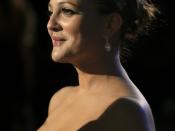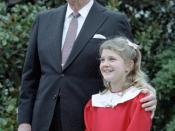PART A Little Girl Lost is an autobiography of Drew Barrymore co-written with PEOPLE magazine's Todd Gold. Drew Barrymore, a twenty-five year old actress (ET, Never Been Kissed, to-be-released Charlie's Angels) has overcome an addiction, proven herself to be a competent, intelligent woman, and is a major influential role model among today's teenage girls. Her biography begins with her first blockbuster, ET, and her experiences while filming and during post-production, as well as the relationships that were made and have served as basis of support throughout her whole life (Steven Spielberg as her Godfather). From there Drew travels backwards, providing a brief background of her parents, of her role in continuing the Barrymore family legacy within film industry, and then of the Barrymore's tendency to indulge in drugs and alcohol. Drew confronts the tabloids and gossip columns regarding the attention she received at such a young age, acknowledging the belief by many that she was a victim of 'celebrity glamour and fame'.
Drew argues that her addiction to mind-altering substances stemmed not from the high profile lifestyle, but from her insecurities as a young girl conquering adolescence. When she was not filming, Drew attempted a normal life by attending a public school, where she was isolated because of her erratic schedules and enormous amounts of public speculation. Unfortunately, Drew longed for a regular life with real friends and a family similar to those of her classmates. Because of her experiences filming, she was more mature than her peers, causing Drew to feel not only different, but giving her no one with which she could relate to. Her mother, Jaid, whom also served as Drew's manager, became the punching bag to Drew's frustrations. Entering her teenage years, Drew describes numerous incidents where she was offered a variety of drugs, depicting how easily available drugs were for her. What should have been parental and authoritative figures to Drew, served as gateways for Drew's soon-to-be addiction, enabling rather than protecting her. Drew Barrymore, from the time she was seven years old, displayed signs of Depression, and later, an uncontrollable addiction to most mind-altering substances, taking her in and out of Drug Rehabilitation three different times. At an age too young to understand Drew was forced to acknowledge her weaknesses, recognize her faults, and accept herself as whom she was.
PART B I enjoyed this book having been a young girl who LOVED to act and adopt different characters and their fictitious lives; I can understand the exhilaration felt from acting. I also relate to the difficulties of adolescence, having been to Drug Rehab too at a young age. Drew's informal tone speaks directly to the reader and I felt it comforting, as well as easy to relate to. She also did a remarkable job not glamorizing drugs or the lifestyle she lived as a child and teenager. She explains her experiences and then sandwiches them between what she loved and learned from them, what her expectations had been, and what her observations were in comparing them to a "normal girl's life". Drew is able to convey to what degree she felt isolated, fortunate, different, and confused all at the same time. In addition, Drew enlightens readers as she explains the daily struggle of overcoming and then living with an addiction. She describes her relapse from sobriety [a few times] before she ultimately committed herself to a better life- for her and her loved ones. It is only by confronting her insecurity issues and actually looking at what had made her vulnerable, that she is able to overcome adversity.





